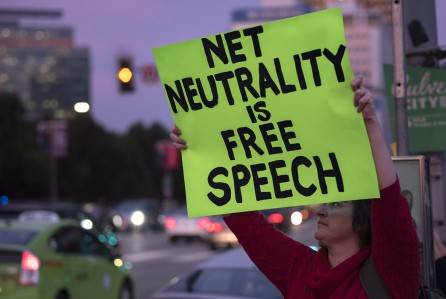

California’s legislators passed the nation’s strongest net neutrality law today, restoring Obama-era open Internet protections and setting the state on a potential collision course with federal regulators.
If Gov. Jerry Brown signs the bill into law in the coming weeks, California will join a growing number of states that have adopted net neutrality rules that conflict with the actions of the FCC. That could result in clash that rises all the way to U.S. Supreme Court.
“The Internet is at the heart of 21st century life — our economy, our public safety and health systems, and our democracy,” said the bill’s author, Sen. Scott Wiener (D-San Francisco). “So when Donald Trump’s FCC decided to take a wrecking ball to net neutrality protections, we knew that California had to step in to ensure our residents have access to a free and open Internet.”
The Senate voted 27-12 this afternoon to approve the bill, which prohibits internet providers from blocking or slowing access to websites or apps or charging fees for faster access, a concept known as “paid prioritization.”
The legislation also bans zero-rated programs, in which internet providers exempt certain kinds of content from counting against monthly data limits. Critics have said zero-rated programs allow mobile carriers like AT&T to advantage their own streamed content, like, say, HBO Now.
The bill passed the state Assembly yesterday in a landslide 61-18 vote with bipartisan support.
“Net neutrality is the free speech fight of our generation, and we’re winning,” said Evan Greer, deputy director of Fight for the Future, an advocacy group that supported the legislation. “If there’s one thing this victory in California shows it’s that Internet users are still royally pissed off about the FCC’s repeal of net neutrality. They’re still paying attention. And they’re not going to let their elected officials get away with selling out their constituents by siding with big telecom companies.”
It remains to be seen whether California’s legislation will withstand likely legal challenges from the telecommunications industry. Indeed, the FCC’s Restoring Internet Freedom Order, which abolished net neutrality rules the commission enacted in 2015, claims to pre-empt such state rules.
An FCC spokesperson did not respond to Deadline’s request for comment.
Internet providers were quick to criticize the vote, which they saw as undercutting the state’s history as a catalyst for innovation.
“The Internet must be governed by a single, uniform and consistent national policy framework, not state-by-state piecemeal approaches,” said Jonathan Spalter, president and CEO of USTelecom, a broadband industry trade group. “Governor Brown should use his veto pen on this legislation, and Congress should step in to legislate and provide consumer protections that will resolve this issue once and for all.”
The cable and wireless industry have been lobbying against California’s bill, saying it would result in an unworkable tangle of state regulations.
The Electronic Frontier Foundation, a nonprofit agency pledged to defend civil rights in the digital world, called out the industry for a flood of deceptive robocalls targeting seniors, stating that net neutrality would increase their cell phone bills by $30 a month and slow down the Internet.
California’s net neutrality bill received an unexpected boost earlier this month, when Verizon slowed internet service to the Santa Clara County firefighters in the midst of battling the massive Mendocino complex fire. The carrier admitted called that a “customer support mistake.”
A number of other states have similarly sought to protect net neutrality. The governors in six states — Hawaii, New Jersey, New York, Montana, Rhode Island and Vermont — signed executive orders restoring some open Internet rules. The state legislatures in Oregon, Vermont and Washington enacted net neutrality legislation.